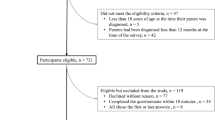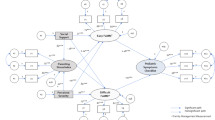Abstract
The factors that influence caregiver coping mechanism preferences after a child’s diagnosis with cancer are not fully understood. This study examines the relationship between caregivers’ socio-demographic characteristics and the coping strategies they use to adapt to childhood cancer. Sixty caregivers of pediatric cancer patients completed a socio-demographic questionnaire, the Family Environment Scale, and the COPE inventory. There were no significant differences in family environment by income or education. Caregiver educational attainment was positively associated with use of planning and active coping styles, while income was not associated with caregiver coping style. Mothers were more likely than fathers to use active coping, instrumental support, religious coping, and emotional support. Men with lower education engaged in greater substance use coping and lower planning. The findings show that educational attainment and caregiver gender influence caregiver coping styles following a pediatric cancer diagnosis and suggest that educational attainment rather than financial resources drive the association between SES and coping. Programs that address educational gaps and teach caregivers planning and active coping skills may be beneficial for parents with lower educational attainment, particularly men.

Similar content being viewed by others
References
Ahnis, A., Riedl, A., Rigura, A., Steinhagen-Thiessen, E., Liebl, M. E., & Klapp, B. F. (2012). Psychological and socio-demographic predictors of premature discontinuation of a 1-year multimodal outpatient weight-reduction program: An attrition analysis. Journal of Patient Preference and Adherence, 6, 165–177.
Ashida, S., Hadley, D. W., Vaughn, B. K., Kuhn, N. R., Jenkins, J. F., & Koehly, L. M. (2009). The impact of familial environment on depression scores after genetic testing for cancer susceptibility. Clinical Genetics, 75, 43–49.
Baskin, C. H., Forehand, R., & Saylor, C. (1985). Predictors of psychological adjustment in mothers of children with cancer. Journal of Psychosocial Oncology, 3, 43–54.
Braveman, P. A., Cubbin, C., Egerter, S., Chideya, S., Marchi, K. S., Metzler, M., et al. (2005). Socioeconomic status in health research: One size does not fit all. JAMA, 294, 2879–2888.
Brown, H., & Prescott, R. (2006). Applied mixed models in medicine. West Sussex, England: Wiley.
Carver, C. S., Scheier, M. F., & Weintraub, J. K. (1989). Assessing coping strategies: A theoretically based approach. Journal of Personality and Social Psychology, 56, 267–283.
Chesler, M. A., & Parry, C. (2001). Gender roles and/or styles in crisis: An integrative analysis of the experiences of fathers of children with cancer. Qualitative Health Research, 11, 363–384.
Dasch, K. B., Russell, H. F., Kelly, E. H., Gorzkowski, J. A., & Mulcahey, M. J. (2011). Coping in caregivers of youth with spinal cord injury. Journal of Clinical Psychology in Medical Settings (e-pub ahead of print, August 22, 2011).
Enskar, K., Hamrin, E., Carlson, M., & von Essen, L. (2011). Swedish mothers and fathers of children with cancer: Perceptions of well-being, social life, and quality of life. Journal of Psychosocial Oncology, 29, 51–66.
Folkman, S., Lazarus, R. S., Dunkel-Schetter, C., DeLongis, A., & Gruen, R. J. (1986). Dynamics of a stressful encounter: Cognitive appraisal, coping, an encounter outcomes. Journal of Personality and Social Psychology, 50, 992–1003.
Frank, N. C., Blount, R. L., & Brown, R. T. (1997). Attributions, coping and adjustment in children with cancer. Journal of Pediatric Psychology, 22, 563–576.
Gage, E. A. (2013). The dynamics and processes of social support: Families’ experiences coping with a serious pediatric illness. Sociology of Health and Illness, 35(3), 405–418.
Gold, J. I., Treadwell, M., Weissman, L., & Vichinsky, E. (2011). The mediating effects of family functioning on psychosocial outcomes in healthy siblings of children with sickle cell disease. Pediatric Blood Cancer (Epub ahead of print, February 25 2011).
Goldbeck, L. (2001). Parental coping with the diagnosis of childhood cancer: Gender effects, dissimilarity within couples, and quality of life. Psycho-Oncology, 10, 325–335.
Grootenhuis, M. A., & Last, B. F. (1997). Adjustment and coping by parents of children with cancer: A review of the literature. Supportive Care in Cancer, 5, 466–484.
Herd, P., Goesling, B., & House, J. S. (2007). Socioeconomic position and health: The differential effects of education versus income on the onset versus progression of health problems. Journal of Health and Social Behavior, 48, 223–238.
Hill, K., Higgins, A., Dempster, M., & McCarthy, A. (2009). Fathers’ views and understanding of their roles in families with a child with acute lymphoblastic leukaemia: An interpretive phenomenological analysis. Journal of Health Psychology, 14, 1268–1280.
Hoekstra-Weebers, J. E. H. M., Jaspers, J. P. C., Kamps, W. A., & Klip, E. C. (1999). Risk factors for psychological maladjustment of parents of children with cancer. Journal of the American Academy of Child Adolescent Psychology, 38, 1526–1535.
Hoekstra-Weebers, J. E. H. M., Wijnberb-Williams, B. J., Jaspers, J. P. C., Kamps, W. A., & van de Wiel, H. B. M. (2011). Coping and its effect on psychological distress of parents of pediatric cancer patients: a longitudinal prospective study. Psycho-Oncology (Epub ahead of print, May 24, 2011).
Jobe-Shields, L., Alderfer, M. A., Barrera, M., Vannatta, K., Currier, J. M., & Phipps, S. (2009). Parental depression and family environment predict distress in children prior to stem-cell transplantation. Journal of Developmental and Behavioral Pediatrics, 30, 140–146.
Kenward, M. G. & Roger, J. H. (1997). Small sample inference for fixed effects from restricted maximum likelihood. Biometrics, 53, 983–997.
Klassen, A. F., Raina, P., McIntosh, C., Sung, L., Klaassen, R. J., O’Donnell, M., et al. (2011). Parents of children with cancer: which factors explain differences in health-related quality of life. International Journal of Cancer, 129, 1190–1198.
Kupst, M. J., Natta, M. B., Richardson, C. C, Schulman, J. L., Lavigne, J. V., & Das, L. (1995). Family coping with pediatric leukemia: Ten years after treatment. Journal of Pediatric Psychology, 20, 601–617.
Long, K. A., & Marsland, A. L. (2011). Family adjustment to childhood cancer: A systematic review. Clinical Child and Family Psychology Review, 14, 57–88.
Lopez-Olivo, M. A., Landon, G. C., Siff, S. J., Edelstein, D., Pak, C., Kallen, M. A., et al. (2011). Psychosocial determinants of outcomes in knee replacement. Annals of the Rheumatic Diseases, 70, 1775–1781.
Martin, S., Calabrese, S. K., Wolters, P. L., Walker, K. A., Warren, K., & Hazra, R. (2011). Family functioning and coping styles in families of children with cancer and HIV disease. Clinical Pediatrics (Epub ahead of print August 25, 2011).
Moos, R. (1990). Conceptual and empirical approaches to developing family-based assessment procedures: Resolving the case of the Family Environment Scale. Family Process, 29, 199–208.
Moos, R., & Moos, B. (1994). Family Environment Scale manual: Development, applications, research (3rd ed.). Palo Alto, CA: Consulting Psychologist Press.
Ogburn, K. M., Sanches, M., Williamson, D. E., Caetano, S. C., Olvers, R. L., Pliszka, S., et al. (2010). Family environment and pediatric major depressive disorder. Psychopathology, 43, 312–318.
Pai, A. L. H., Greenley, R. N., Lewandowski, A., Drotar, D., Youngstrom, E., & Peterson, C. C. (2007). A meta-analytic review of the influence of pediatric cancer on parent and family functioning. Journal of Family Psychology, 21, 407–415.
Palmer, S. L., Lesh, S., Wallace, D., Bonner, M. J., Swain, M., Chapieski, L., et al. (2011). Hoe parents cope with their child’s diagnosis and treatment of an embryonal tumor: Results of a prospective and longitudinal study. Journal of Neuro-oncology, 105, 253–259.
Paredes, T., Pereira, M., Simoes, M. R., & Canavarro, M. C. (2012). A longitudinal study on emotional adjustment of sarcoma patients: the determinant role of demographic, clinical and coping variables. European Journal of Cancer Care, 21, 41–51.
Pheula, G. F., Rhode, L. A., & Schmitz, M. (2011). Are family variables associated with ADHD, inattentive type? A case-control study in schools. European Child and Adolescent Psychiatry, 20, 137–145.
Rodriguez, E. M., Dunn, M. J., Zuckerman, T., Vannatta, K., Gerhardt, C. A., & Compas, B. E. (2012). Cancer-related sources of stress for children with cancer and their parents. Journal of Pediatric Psychology, 37, 185–197.
Rother, S., & Cohen, L. J. (1986). Approach, avoidance, and coping with stress. American Psychologist, 41, 813–819.
Schnittker, J. (2004). Education and the changing shape of the income gradient in health. Journal of Health and Social Behavior, 45, 286–305.
Singh-Manoux, A., Adler, N. E., & Marmot, M. G. (2003). Subjective social status: Its determinants and its association with measures of ill-health in the Whitehall II study. Social Science and Medicine, 56, 1321–1333.
Singh-Manoux, A., Marmot, M. G., & Adler, N. E. (2005). Does subjective social status predict health and change in health status better than objective status? Psychosomatic Medicine, 67, 855–861.
Thompson, R. J., Jr, Gustafson, K. E., Hamlett, K. W., & Spock, A. (1992). Stress, coping, and family functioning in the psychological adjustment of mothers of children with cystic fibrosis. Journal of Pediatric Psychology, 17, 573–585.
Vachha, B., & Adams, R. (2009). Implications of family environment and language development: Comparing typically developing children to those with spina bifida. Child: Care, Health and Development, 35, 709–716.
Wenninger, K., Helmes, A., Bengel, J., Lauten, M., Volkel, S., & Niemeyer, C. M. (2012). Coping in long-term survivors of childhood cancer: relations to psychological distress. Psycho-Oncology, 28 (Epub ahead of print).
Yeh, C.-H. (2002). Gender differences of parental distress in children with cancer. Journal of Advanced Nursing, 38, 598–606.
Zelikovsky, N., Schast, A. P., & Jean-Francois, D. (2007). Parent stress and coping: Waiting for a child to receive a kidney transplant. Journal of Clinical Psychology in Medical Settings, 14, 320–329.
Acknowledgments
This research was supported by the National Institutes of Health, grants R21CA141165, R25CA114101 and R25CA10618. We would like to thank Martin Brecher, Deborah Erwin, Michael Farrell, James Marshall, Debra Street, Robert Wagmiller, Michael Zevon, Gary Morrow, and the anonymous reviewers for their extensive and helpful feedback throughout this project. This research would not have been possible without our dedicated research team, Christina Panagakis, Nikia Clark, Jessica Keaton, Brandee Aquilino, Kristen Fix and all of the families who generously participated in the study.
Author information
Authors and Affiliations
Corresponding author
Rights and permissions
About this article
Cite this article
Gage-Bouchard, E.A., Devine, K.A. & Heckler, C.E. The Relationship between Socio-demographic Characteristics, Family Environment, and Caregiver Coping in Families of Children with Cancer. J Clin Psychol Med Settings 20, 478–487 (2013). https://doi.org/10.1007/s10880-013-9362-3
Published:
Issue Date:
DOI: https://doi.org/10.1007/s10880-013-9362-3




